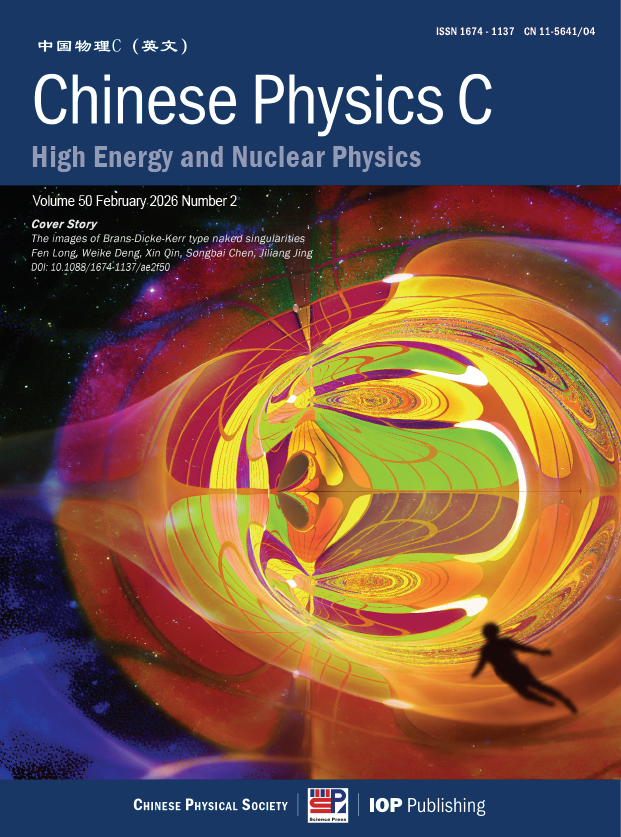2004 Vol. 28, No. 9
Display Method: |
Abstract:
High-spin band structures in 184Au have been re-investigated using the 159Tb(29Si,4nγ) 184Au reaction and the multi-detector array of GASP.The rotational bands built on the πh9/2⊙7/2- and πi13/2⊙νi13/2 2-quasiparticle configurations have been extended up to higher-spin states.Of most importance,linking transitions between the two bands and to the ground state have been established leading to firm spin and parity assignments for the πi13/2⊙νi13/2 band in 184Au.This result provides a strong evidence for the prediction that the low-spin signature inversion could occur in the πi13/2⊙νi13/2 bands of odd-odd nuclei in the A≈180 mass region.The quasipartice alignments and the dynamical moment of inertia have been analyzed for the πi13/2⊙νi13/213/2 band in 184Au,the πi13/2 and πh9/2 bands in 183Au,and the νi13/2 band in 183Pt.It is concluded that the first band-crossing observed in the πi13/2⊙νi13/2 band of 184Au corresponds to a pair of h 9/2-proton alignment.This proton alignment may play important role in the πi13/2 band of 183Au,the νi13/2 band of 183Pt,as well as in the ground-state band of 182Pt.
High-spin band structures in 184Au have been re-investigated using the 159Tb(29Si,4nγ) 184Au reaction and the multi-detector array of GASP.The rotational bands built on the πh9/2⊙7/2- and πi13/2⊙νi13/2 2-quasiparticle configurations have been extended up to higher-spin states.Of most importance,linking transitions between the two bands and to the ground state have been established leading to firm spin and parity assignments for the πi13/2⊙νi13/2 band in 184Au.This result provides a strong evidence for the prediction that the low-spin signature inversion could occur in the πi13/2⊙νi13/2 bands of odd-odd nuclei in the A≈180 mass region.The quasipartice alignments and the dynamical moment of inertia have been analyzed for the πi13/2⊙νi13/213/2 band in 184Au,the πi13/2 and πh9/2 bands in 183Au,and the νi13/2 band in 183Pt.It is concluded that the first band-crossing observed in the πi13/2⊙νi13/2 band of 184Au corresponds to a pair of h 9/2-proton alignment.This proton alignment may play important role in the πi13/2 band of 183Au,the νi13/2 band of 183Pt,as well as in the ground-state band of 182Pt.
Abstract:
The Sino-Italian collaboration YBJ-ARGO experiment is under construction at the Yang Bajing High Altitude Cosmic Ray Laboratory(Tibet,China,4300m a.s.l.,606g/cm2).About 693m2 of preliminary carpet detector have been instrumented and put into operation for calibration runs devoted to test the performance of the individual components and their integrated operation.Events collected with a "shower mode" trigger have been recorded to check the consistency of physics data.The performance and characteristics of a preliminary carpet detector are analyzed using its test run data at the high altitude conditions.Shower reconstruction algorithms are described together with the results after time offset correction.Results of the test run show the importance of the time correction for data analysis,and some results concerning detector calibration,azimuth angle distribution,zenith angle distribution and angular resolution are presented.
The Sino-Italian collaboration YBJ-ARGO experiment is under construction at the Yang Bajing High Altitude Cosmic Ray Laboratory(Tibet,China,4300m a.s.l.,606g/cm2).About 693m2 of preliminary carpet detector have been instrumented and put into operation for calibration runs devoted to test the performance of the individual components and their integrated operation.Events collected with a "shower mode" trigger have been recorded to check the consistency of physics data.The performance and characteristics of a preliminary carpet detector are analyzed using its test run data at the high altitude conditions.Shower reconstruction algorithms are described together with the results after time offset correction.Results of the test run show the importance of the time correction for data analysis,and some results concerning detector calibration,azimuth angle distribution,zenith angle distribution and angular resolution are presented.
Abstract:
If the JP of Θ+ 5 and Ξ--5 pentaquarks is really found to be 12+ in future experiments,they will be accompanied by JP=32+ partners in some models.It is reasonable to expect that these JP=32+ states will also be discovered in the near future with the current intensive experimental and theoretical efforts.We estimate JP=32+ pentaquark magnetic moments using different models.
If the JP of Θ+ 5 and Ξ--5 pentaquarks is really found to be 12+ in future experiments,they will be accompanied by JP=32+ partners in some models.It is reasonable to expect that these JP=32+ states will also be discovered in the near future with the current intensive experimental and theoretical efforts.We estimate JP=32+ pentaquark magnetic moments using different models.
Abstract:
We derive and express for the B→π transition form factor only depending on the twist-3 distribution amplitudes by choosing an adequate chiral current correlator in the light-cone QCD sum rules.Our result shows that the contribution from the twist-3 distribution amplitudes to the f+Bπ(q2)gives a constraint on the twist-3 light-cone distribution amplitude.
We derive and express for the B→π transition form factor only depending on the twist-3 distribution amplitudes by choosing an adequate chiral current correlator in the light-cone QCD sum rules.Our result shows that the contribution from the twist-3 distribution amplitudes to the f+Bπ(q2)gives a constraint on the twist-3 light-cone distribution amplitude.
Abstract:
In this paper we calculate the production of a charged technipion in association with a W boson at the CERN Large Hadron Collider(LHC)in the context of the topcolor assisted multiscale technicolor(TOPCMTC)model.We find that the cross section of pp→b→W±π is roughly corresponding to the result of the process pp→b→W±H in the minimal supersymmetric standard model,and for reasonable ranges of the parameters,the cross section can reach some dozens or even more than one hundred fb.The W±π signal may be clearly visible at LHC.
In this paper we calculate the production of a charged technipion in association with a W boson at the CERN Large Hadron Collider(LHC)in the context of the topcolor assisted multiscale technicolor(TOPCMTC)model.We find that the cross section of pp→b→W±π is roughly corresponding to the result of the process pp→b→W±H in the minimal supersymmetric standard model,and for reasonable ranges of the parameters,the cross section can reach some dozens or even more than one hundred fb.The W±π signal may be clearly visible at LHC.
Abstract:
In this paper,we propose a new quantum derivative nonlinear Schrdinger model for spin-12 particles.With the help of Lax operator,we construct the monodromy matrix.It is shown that the monodromy matrix satisfies Yang-Baxter equation.Infinite conserved quantities can be obtained by expanding the monodromy matrix repecting to the spectrum parameter.
In this paper,we propose a new quantum derivative nonlinear Schrdinger model for spin-12 particles.With the help of Lax operator,we construct the monodromy matrix.It is shown that the monodromy matrix satisfies Yang-Baxter equation.Infinite conserved quantities can be obtained by expanding the monodromy matrix repecting to the spectrum parameter.
Abstract:
High-spin level structure of 94Mo has been re-investigated using the modern multidetector array of GASP via the 16O(82Se,4nγ) 94Mo reaction at E(82Se)=459 MeV.The previously reported level scheme has been largely modified up to~10 MeV in excitation energy due to identifications of some important linking transitions.The level structure of 94Mo has been compared with the shell model calculations.It is suggested that the valence neutron excitation within d5/2,g7/2,and h11/2 orbitals should be taken into account in order to adequately describe the high-spin level structure of 94Mo above Iπ=14+.
High-spin level structure of 94Mo has been re-investigated using the modern multidetector array of GASP via the 16O(82Se,4nγ) 94Mo reaction at E(82Se)=459 MeV.The previously reported level scheme has been largely modified up to~10 MeV in excitation energy due to identifications of some important linking transitions.The level structure of 94Mo has been compared with the shell model calculations.It is suggested that the valence neutron excitation within d5/2,g7/2,and h11/2 orbitals should be taken into account in order to adequately describe the high-spin level structure of 94Mo above Iπ=14+.
Abstract:
We derive a new Paschos-Wolfenstein relationship which should bring an important correction to Weinberg angle sin2θ w when considering the quark-antiquark asymmetry in the nucleon sea.We also obtain the distributions of asymmetric strangeantistrange sea by using the light-cone meson-baryon fluctuation model with two kinds of wave functions,respectively.The most important issue is that the correction of asymmetric strange-antistrange sea can reduce approximately 30%-80% of the difference with three standard deviations between the measured value of the Weinberg angle sin2θ w by the NuTeV Collaboration and the predicted value by the standard model.
We derive a new Paschos-Wolfenstein relationship which should bring an important correction to Weinberg angle sin2θ w when considering the quark-antiquark asymmetry in the nucleon sea.We also obtain the distributions of asymmetric strangeantistrange sea by using the light-cone meson-baryon fluctuation model with two kinds of wave functions,respectively.The most important issue is that the correction of asymmetric strange-antistrange sea can reduce approximately 30%-80% of the difference with three standard deviations between the measured value of the Weinberg angle sin2θ w by the NuTeV Collaboration and the predicted value by the standard model.
Abstract:
Nucleon-χcJ dissociation cross sections obtained in the quark exchange mechanism are applied to study χcJ suppression in hadronic matter created in central Pb+Pb and S+Pb collisions.Thermal average of the product of the dissociation cross section and the relative velocity of nucleon and χcJ is discussed.The survival probabilities of χcJ in the central Pb+Pb and S+Pb collisions show that the suppression caused by the collisions with nucleons and antinucleons is appreciable.
Nucleon-χcJ dissociation cross sections obtained in the quark exchange mechanism are applied to study χcJ suppression in hadronic matter created in central Pb+Pb and S+Pb collisions.Thermal average of the product of the dissociation cross section and the relative velocity of nucleon and χcJ is discussed.The survival probabilities of χcJ in the central Pb+Pb and S+Pb collisions show that the suppression caused by the collisions with nucleons and antinucleons is appreciable.
Abstract:
The cross sections for (n,2n) reaction are measured on Neodymium isotopes at the neutron energies of 13.5-14.6MeV using activation technique.The cross section data for the reactions of 150Nd(n,2n)149Nd,148Nd(n,2n)147Nd and 142Nd(n,2n)141Nd are reported.The cross sections of 150Nd(n,2n)149Nd reaction are 2037±85,1737±68 and 1657±65mb at 13.5±0.2,14.1±0.1 and 14.6±0.2MeV respectively.The cross sections of 148Nd(n,2n)147Nd reaction are 1394±58,1416±54 and 1956±76mb at 13.5±0.2,14.1±0.1 and 14.6±0.2MeV respectively.The cross sections of 142Nd(n,2n)141Nd reaction are 1501±59,1623±62 and 1764±111mb at 13.5±0.2,14.1±0.1 and 14.6±0.2MeV respectively.The neutron fluences are determined by the cross sections of 93Nb(n,2n)92mNb reaction.The comparison between the present results and the previously published data is made.
The cross sections for (n,2n) reaction are measured on Neodymium isotopes at the neutron energies of 13.5-14.6MeV using activation technique.The cross section data for the reactions of 150Nd(n,2n)149Nd,148Nd(n,2n)147Nd and 142Nd(n,2n)141Nd are reported.The cross sections of 150Nd(n,2n)149Nd reaction are 2037±85,1737±68 and 1657±65mb at 13.5±0.2,14.1±0.1 and 14.6±0.2MeV respectively.The cross sections of 148Nd(n,2n)147Nd reaction are 1394±58,1416±54 and 1956±76mb at 13.5±0.2,14.1±0.1 and 14.6±0.2MeV respectively.The cross sections of 142Nd(n,2n)141Nd reaction are 1501±59,1623±62 and 1764±111mb at 13.5±0.2,14.1±0.1 and 14.6±0.2MeV respectively.The neutron fluences are determined by the cross sections of 93Nb(n,2n)92mNb reaction.The comparison between the present results and the previously published data is made.
Abstract:
We discuss p+A→p′+π+A′reactions on spin 0 isospin 0 targets at high energies in the frame work of relativistic theory.We analyse the characters of mechanism of the N(1440) excitation in the projectile.Numerical results are shown for the reaction on 12C with the 2.5GeV proton beam by using this mechanism.The effect of the nuclear distortion of the incoming and outgoing waves on the reaction is discussed.The feasibility and the significance of an experimental study of this reaction at CSR in Lanzhou is discussed.
We discuss p+A→p′+π+A′reactions on spin 0 isospin 0 targets at high energies in the frame work of relativistic theory.We analyse the characters of mechanism of the N(1440) excitation in the projectile.Numerical results are shown for the reaction on 12C with the 2.5GeV proton beam by using this mechanism.The effect of the nuclear distortion of the incoming and outgoing waves on the reaction is discussed.The feasibility and the significance of an experimental study of this reaction at CSR in Lanzhou is discussed.
Abstract:
Taking into account the jet quenching,we calculate dihadron production numerically when a hard parton jet produced in relativistic high energy heavy ion collision passes through strong interaction medium.It turns out that the dihadron with large invariable mass spectrum and large transverse momentum are all suppressed in the central nucleus-nucleus collision because of jet quenching effect.It is similar to the p-p collision,the produced hadron back-to-back correlation is strong for the peripheral nucleus-nucleus collision.This correlation is much weaker with decreasing the values of compact parameter.
Taking into account the jet quenching,we calculate dihadron production numerically when a hard parton jet produced in relativistic high energy heavy ion collision passes through strong interaction medium.It turns out that the dihadron with large invariable mass spectrum and large transverse momentum are all suppressed in the central nucleus-nucleus collision because of jet quenching effect.It is similar to the p-p collision,the produced hadron back-to-back correlation is strong for the peripheral nucleus-nucleus collision.This correlation is much weaker with decreasing the values of compact parameter.
Abstract:
The linear and nonlinear Walecka model has been used to investigate the relation between the scalar density ρS and the vector ρB in the relativistic mean-field approximation and the calculated results of the relation are presented.By using the results,we analyse the parameter effects on the effective masses of kaon and antikaon with different models.The effective masses of kaon and antikaon in asymmetric nuclear matter are also studied by using different models with different parameter sets.The difference of the effective masses between in symmetric and asymmetry nuclear matter is discussed.
The linear and nonlinear Walecka model has been used to investigate the relation between the scalar density ρS and the vector ρB in the relativistic mean-field approximation and the calculated results of the relation are presented.By using the results,we analyse the parameter effects on the effective masses of kaon and antikaon with different models.The effective masses of kaon and antikaon in asymmetric nuclear matter are also studied by using different models with different parameter sets.The difference of the effective masses between in symmetric and asymmetry nuclear matter is discussed.
Abstract:
The final states created by e+e- annihilation at τ-charm energy region are simulated with PYTHIA5.7,and the resultant inclusive muon production cross sections and momentum distributions are obtained.The muon identifier of BESⅢ detector is fully simulated with Geant3.21.For the simulated events containing muons and pions with momentum greater than 0.5GeV/c,the BP neural network and Fisher discriminant method are used for muon/pion identification.BP neural network performs better than Fisher discriminant method.With the same muon efficiency of 96%,the misidentification of pion by BP neural network is 9.4%,in comparison with that of 17.1% by Fisher method.
The final states created by e+e- annihilation at τ-charm energy region are simulated with PYTHIA5.7,and the resultant inclusive muon production cross sections and momentum distributions are obtained.The muon identifier of BESⅢ detector is fully simulated with Geant3.21.For the simulated events containing muons and pions with momentum greater than 0.5GeV/c,the BP neural network and Fisher discriminant method are used for muon/pion identification.BP neural network performs better than Fisher discriminant method.With the same muon efficiency of 96%,the misidentification of pion by BP neural network is 9.4%,in comparison with that of 17.1% by Fisher method.
Abstract:
We simulated the VC trigger system of BESⅡ in the frame of SIMBES-the Geant-3 based detector simulation package,calculated the VC trigger efficiencies for certain decay channels and found that the VC trigger efficiencies from those events with the second vertexes and long decay length are low.From this point of view,considering the physics interests of BESⅢ,we discussed some typical decay channels related with trigger efficiency and hope it will be helpful for the trigger table design.
We simulated the VC trigger system of BESⅡ in the frame of SIMBES-the Geant-3 based detector simulation package,calculated the VC trigger efficiencies for certain decay channels and found that the VC trigger efficiencies from those events with the second vertexes and long decay length are low.From this point of view,considering the physics interests of BESⅢ,we discussed some typical decay channels related with trigger efficiency and hope it will be helpful for the trigger table design.
Abstract:
The reconstruction method of muon tracks in the L3 Cosmic Ray Experiment has been studied.The affection caused by the non-uniformity of magnetic field,multiple scattering and other random processes have been investigated by the Geane package.After correction,the momentum resolution of the reconstructed muons was improved.
The reconstruction method of muon tracks in the L3 Cosmic Ray Experiment has been studied.The affection caused by the non-uniformity of magnetic field,multiple scattering and other random processes have been investigated by the Geane package.After correction,the momentum resolution of the reconstructed muons was improved.
Abstract:
Sensitivity of combination PIN detector was studied.The neutron sensitivity of the detector was measured and simulated by Monte-Carlo method.The detector's gamma sensitivity was measured and compared to usual PIN detector.The experiment and calculation study indicate that the neutron sensitivity of combination PIN detector can be adjusted by selecting polyethylene converter,and the detector is insensitive to gammarays.The combination PIN detector can be used to detect pulse neutron in neutron and gamma mixture radiation field.
Sensitivity of combination PIN detector was studied.The neutron sensitivity of the detector was measured and simulated by Monte-Carlo method.The detector's gamma sensitivity was measured and compared to usual PIN detector.The experiment and calculation study indicate that the neutron sensitivity of combination PIN detector can be adjusted by selecting polyethylene converter,and the detector is insensitive to gammarays.The combination PIN detector can be used to detect pulse neutron in neutron and gamma mixture radiation field.
Abstract:
The beam decelerating process with changing harmonic has been studied and simulated in this article.The main RF parameters matching the magnetic field has been calculated according to the simulating result.In addition,the distribution of particles in longitudinal phase space during the decelerating process has been obtained.
The beam decelerating process with changing harmonic has been studied and simulated in this article.The main RF parameters matching the magnetic field has been calculated according to the simulating result.In addition,the distribution of particles in longitudinal phase space during the decelerating process has been obtained.
Abstract:
In this paper,we analyze the nonlinear transport of the particle motions in the Wein filter up to the third order with the Lie algebraic method.First,we set up the Hamiltonian for the Wein filter;then expand the Hamiltonian into a sum of homogeneous polynomials of different degrees;finally,calculate the particle's nonlinear trajectories up to the third order.Higher orders could be obtained if necessary.
In this paper,we analyze the nonlinear transport of the particle motions in the Wein filter up to the third order with the Lie algebraic method.First,we set up the Hamiltonian for the Wein filter;then expand the Hamiltonian into a sum of homogeneous polynomials of different degrees;finally,calculate the particle's nonlinear trajectories up to the third order.Higher orders could be obtained if necessary.
Abstract:
According to characteristics of Linear Induction Accelerator(LIA),the model of cylindrically symmetric DC beams is adopted in this paper.The differential equation of RMS emittance growth is derived.One of the emittance growth mechanism is presented,which assumes that the beam profile will not stop evolving unless it has Gaussian distribution due to non-linearity during beam transportation.Consequently,the emittance growth is calculated from K-V distribution to Gaussian distribution,and the control methods of emittance growth is discussed.
According to characteristics of Linear Induction Accelerator(LIA),the model of cylindrically symmetric DC beams is adopted in this paper.The differential equation of RMS emittance growth is derived.One of the emittance growth mechanism is presented,which assumes that the beam profile will not stop evolving unless it has Gaussian distribution due to non-linearity during beam transportation.Consequently,the emittance growth is calculated from K-V distribution to Gaussian distribution,and the control methods of emittance growth is discussed.
Abstract:
Theoretical analysis of thermal emittance of photoinjectors is presented in this paper.Thermal emittance of metal photo-cathode mainly consists of two parts.One is due to thermal emittance of ideal flat metal cathode,and the other is due to surface roughness.To analyze the former part of the thermal emittance,a new model for the electron distribution emitted from the photocathode is presented,and a formula of the thermal emittance of an idea flat cathode is derived according to this model,which is ε n,rms,flat=R2·hυ-3m 0c2.As to the influence on the thermal emittance from the roughness of the cathode,we also give the analy-tical results with a simplified model.Surface profile measurement of Copper and Magnesium after diamond cutting shows normalized RMS thermal emittance due to surface roughness is about 0.4mm·mrad.Thermal emittance expressions analytical given in this paper can explain some of the existing experimental results very well.
Theoretical analysis of thermal emittance of photoinjectors is presented in this paper.Thermal emittance of metal photo-cathode mainly consists of two parts.One is due to thermal emittance of ideal flat metal cathode,and the other is due to surface roughness.To analyze the former part of the thermal emittance,a new model for the electron distribution emitted from the photocathode is presented,and a formula of the thermal emittance of an idea flat cathode is derived according to this model,which is ε n,rms,flat=R2·hυ-3m 0c2.As to the influence on the thermal emittance from the roughness of the cathode,we also give the analy-tical results with a simplified model.Surface profile measurement of Copper and Magnesium after diamond cutting shows normalized RMS thermal emittance due to surface roughness is about 0.4mm·mrad.Thermal emittance expressions analytical given in this paper can explain some of the existing experimental results very well.
Abstract:
Crystalline silicon samples were first implanted at room temperature with 160keV He ions at a dose of 5×1016ions/cm2.Some of these samples were then co-implanted with 80 keV Si ions to a dose of 5×1015ions/cm 2,or were co-treated with high density hydrogen plasma.Cross-sectional transmission electronic microscopy(XTEM)was used to study the growth of cavities after the subsequent annealing at 800℃ for 1 hour.Our results clearly show that both the Si implant and plasma hydrogenation can influence the growth of cavities in Si.In Si ion co-implanted sample,the cavities were found to shrink due to the presentation of excess of interstitial-like defects.However,additional plasma hydrogenation leads to enhancement in cavity growth.The results were qualitatively discussed.
Crystalline silicon samples were first implanted at room temperature with 160keV He ions at a dose of 5×1016ions/cm2.Some of these samples were then co-implanted with 80 keV Si ions to a dose of 5×1015ions/cm 2,or were co-treated with high density hydrogen plasma.Cross-sectional transmission electronic microscopy(XTEM)was used to study the growth of cavities after the subsequent annealing at 800℃ for 1 hour.Our results clearly show that both the Si implant and plasma hydrogenation can influence the growth of cavities in Si.In Si ion co-implanted sample,the cavities were found to shrink due to the presentation of excess of interstitial-like defects.However,additional plasma hydrogenation leads to enhancement in cavity growth.The results were qualitatively discussed.
ISSN 1674-1137 CN 11-5641/O4
Original research articles, Ietters and reviews Covering theory and experiments in the fieids of
- Particle physics
- Nuclear physics
- Particle and nuclear astrophysics
- Cosmology
Author benefits
- A SCOAP3 participating journal - free Open Access publication for qualifying articles
- Average 24 days to first decision
- Fast-track publication for selected articles
- Subscriptions at over 3000 institutions worldwide
- Free English editing on all accepted articles
News
- CPC Announces 2025 Outstanding Reviewers
- Chinese Physics C Outstanding Reviewer Award 2023
- Impact factor of Chinese Physics C is 3.6 in 2022
- 2022 CPC Outstanding Reviewer Awards
- The 2023 Chinese New Year-Office closure
Cover Story
- Cover Story (Issue 2, 2026) |The images of Brans-Dicke-Kerr type naked singularities
- Cover Story (Issue 1, 2026) A focused review of quintom cosmology: from quintom dark energy to quintom bounce
- Cover Story (Issue 11, 2025) The Earth-Magnet Assists DAMPE in Studying Cosmic Anti-Electrons
- Cover Story (Issue 9, 2025): Precise measurement of Ïc0 resonance parameters and branching fractions of Ïc0,c2âÏï¼Ïï¼/ K+K-
- Cover Story (Issue 8, 2025) A Novel Perspective on Spacetime Perturbations: Bridging Riemannian and Teleparallel Frameworks












